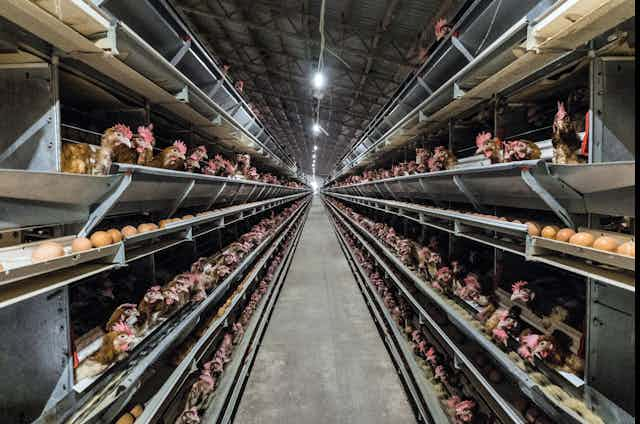With veganism on the rise and entire supermarket aisles now dedicated to veggie and vegan food ranges, it’s a good time to consider what motivates people to go vegan.
There are many reasons why people decide to cut animal products from their diet, but the negative health effects of excessive meat and dairy consumption and the enormous environmental impacts of industrial agriculture are popular ones.
However, the suffering of billions of animals each year in factory farming, referred to in a 2015 Guardian article as one of the “worst crimes in history”, is the most powerful motivation for many, including myself.
Refraining from something that causes so much harm and suffering is laudable, but there’s one argument occasionally used in vegan and animal rights campaigns that warrants closer attention – the idea that consuming other creatures is morally wrong in its own right.
Such views are often bolstered by powerful moral arguments framing animals as subjects of a life, able to experience pain, and as leaders of complex emotional lives.

Opposing meat eating on ontological grounds – meaning, simply because animals are sentient beings, we shouldn’t eat them – separates humans from nature and prevents truly ethical relationships between humans, animals and the natural world. The late environmental philosopher Val Plumwood coined “ontological veganism” to describe this absolute opposition.
Ontological veganism asserts that beings that count as ethical subjects should not be eaten, in the same way that there’s a widespread taboo about eating humans. While this thinking erects another unhelpful boundary between animals and other life forms, it’s also ironic that the rationale underlying taboos against eating humans is the desire to radically separate humans from other animals.
By framing the consumption of other living beings as an inherent moral wrong, ontological veganism also risks demonising predation. In order to avoid this, a common approach is to “excuse” animal predation by arguing that the latter is part of “nature” while humans, as cultural beings, should be exempt.
Some of us – especially those living in wealthy countries – can indeed choose to opt for vegan products, but this argument reproduces another false dichotomy: nature vs. culture. Life is entanglement, with no clear boundaries between “humans” and other species, or between “nature” and “society”.
Ecological Animalism
Come among the deer on the hill, the fish in the river, the quail in the meadows. You can take them, you can eat them, like you they are food. They are with you, not for you.
This quote is from the late utopian author Ursula Le Guin, in her novel Always Coming Home. Her idea is akin to Plumwood’s theory of ecological animalism, which seeks to replace human supremacy over nature with mutual and respectful use between humans and other species.
Ontological veganism would frame using or consuming animals itself as inherently exploitative. But consider forms of mutual use seen in symbiotic relationships, such as those between pollinating insects and plants. In such scenarios, use isn’t oppressive or exploitative. It’s the form of use seen within industrial capitalism, where humans and non-humans alike are treated only as a means to an end, that prevents ethical relationships.
Ecosystems and all living beings depend upon mutual use and consumption. Orcas consume fish and other marine mammals, we must consume living vegetable matter at least, and when we die, we become food for a host of microorganisms, nourishing them in turn.

If humans are indeed animals who differ from other species only by degrees rather than kind, then like them, we are food. To deny this is to deny that humans are embedded within the ecosystems they originate from and are sustained by.
The horrific cruelty involved in industrial factory farming reduces living beings to mere profitable commodities. This is why I am a vegan, and it is here where calls for eradicating or at least reforming animal agriculture find firmer ground.
The ways in which animals are currently treated in agriculture represent the exact opposite of respect and mutuality. No wonder Aldous Huxley observed in his poignant ecotopian work, Island, that
For animals… Satan, quite obviously, is Homo sapiens.
Ecological animalism offers a powerful basis for truly ethical and egalitarian ways of relating to other species. We are all food, and crucially, so much more. We are with and not for one another, and we are all worthy of respect. Go vegan whenever and wherever possible, but be mindful of the underlying rationales involved, lest we reproduce the same harmful dualisms we want to dismantle.

